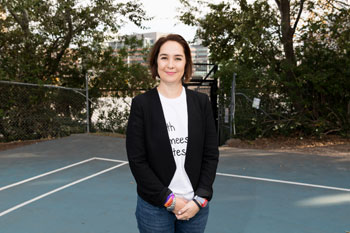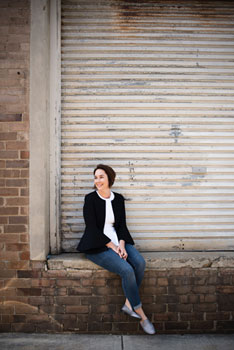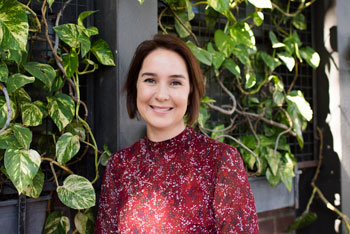Zoe Robinson Yfoundations Interview

Is Your Child Friends with a Homeless Person?
Contrary to its name, couch-surfing is much less fun than it sounds. It's demoralising and it's a little like sticking a Disney band-aid on a deep cut. It's a rapidly increasing form of homelessness, and if you're young and living in NSW chances are you've had a friend who's slept on your couch or a couch of someone you know. It's rarely through any fault of their own and it's certainly not yours, but you can help them get out of this situation.
Zoe Robinson from Yfoundations explains that couch surfing is not like a sleepover since you don't have a home to return to afterward, and as an invisible form of homelessness, it is something that no one really talks about. But that needs to change.
Interview with Zoe Robinson, Chief Executive Officer, Yfoundations
Zoë Robinson is the CEO of Yfoundations, the peak body for youth homelessness in NSW. She is also on the board of MyFoundations (Housing Provider) and Homelessness Australia (National Homelessness Peak), and Chair of the National Youth Coalition for Housing (defunded national peak).
Her law degree, Masters of Human Rights, volunteer experience, and background in the professional services industry, combine with her firm belief that young people should be given every opportunity to succeed and set themselves up for success, and that starts with a stable home and access to basic human rights that allow them to reach their full potential.
 Question: Can you tell us about the most recent youth homelessness stats?
Question: Can you tell us about the most recent youth homelessness stats?
Zoe Robinson: The latest stats are disappointing and alarming. It shows that the rate of youth homelessness in NSW, Australia has increased by 92% since 2006. With 9,048 young people aged 12-24 recorded as homeless on 2016 Census night, the youth homelessness issue in NSW has reached crisis point.
We're talking about children as young as twelve, who through no fault of their own, have slipped through the cracks.
Youth homelessness needs to be given significantly more attention and resource if even the smallest reduction is to be achieved.
We need to look at what we are investing in things that work, like early intervention, 24/7 emergency housing, and medium-term housing solutions. But we also need to ensure that the future is bright with employment pathways and housing options.
Question: How common is couch-surfing in Australian youth?
Zoe Robinson: It is common and it is the data we don't have. Young people who couch surf may not see themselves as homeless or will use a temporary address, so we don't have accurate numbers around it. It's not a sleepover if you can't go home, and every young person needs more than just a bed for a night.
Question: What types of reasons do people experience homelessness?
Zoe Robinson: Youth homelessness is rarely the fault of the victim - rather their plight is commonly collateral damage of domestic violence, mental health, family breakdowns, and financial hardship brought on from wider societal issues. Youth homelessness takes on many forms but, in many cases, they are a hidden statistic.
I often meet young people who are no longer at home because of domestic and family violence situations. It has become unsafe for them to be at home, and a number of them hope to be reunited with their loved ones, but recognise that they need to be safe and protected as well.
Question: What homelessness signs should we look for in school-aged children?
Zoe Robinson: There are a number of signs related to health and nutrition, social and behavioral concerns, hygiene, difficulties in school, and comments made about their parents or their living situation. For example, starting to disengage in school, wearing the same clothes for days, unusual out-of-character behaviour, hoarding food, unmet medical or dental needs, or mentioning staying with grandparents, relatives, friends, in a motel etc.
Question: If these signs are present; how can we approach this sensitive topic with couch surfing friends?
Zoe Robinson: It is important to be patient with the young person and not pressure them. Ask them whether you can contact their parents, ask them how they are finding school, ask them if you can help with anything. Be authentic and interested, and don't pressure them.
See if there is a teacher or friend that they trust, and try and bring them in as support.
Question: How can Australians change this invisible form of homelessness?
Zoe Robinson: Be aware of it. Don't ignore it or think it only occurs in other areas. It is closer than you think.
Be sure to listen to young people and change the way you talk about them and the language you use - they are not bad rebellious youth, rather they are young people who are growing up and in formative years. We need to be aware of our attitude and know that how we act and speak affects them.
Support the services that are making a difference and contact your government representative to increase funding.
Businesses can also be sensitive to the challenges that young people face when trying to rebuild their life after experiencing homelessness. If they apply for a job, they may not have an address for their CV or there may be some gaps in their education because they did not have the means to attend school or did not have a parent to sign necessary forms. But if they would bring value to your business, then you can offer them employment pathways such as additional training.
 Question: What services are offered for young people experiencing homelessness?
Question: What services are offered for young people experiencing homelessness? Zoe Robinson: There are 24/7 crisis services, short term accommodation, and a number of medium-term services that have great impacts. There are hotlines and websites that can help guide a young person to the right services, and there are also sporting programs, arts programs and alternative education pathways that can help.
The right support can make a significant difference to a young person who is homeless. They can get back on track, live life, and contribute - all the things many of us take for granted.
Question: What is Yfoundations?
Zoe Robinson: Yfoundations is the NSW peak body for youth homelessness. We advocate for organisations that provide specialist homelessness services to young people. Importantly, we advocate for young people who are homeless or at risk of homelessness.
Question: What's a typical day like, for you, at Yfoundations?
Zoe Robinson: It involves a lot of meetings and consultation. My role is to represent member services and young people. I can only do that by constantly meeting with them and ensuring I am hearing from them, including to go on regular street walks overnight to meet with young people who are experiencing homelessness and see the incredible work that the support services do.
I also need to work with government to ensure we are working together and being heard. And as CEO each day also involves keeping our team focused and enthusiastic about our work. We spend every day ensuring that what we are doing and focusing on is leading us to ending youth homelessness.
Interview by Brooke Hunter
MORE



